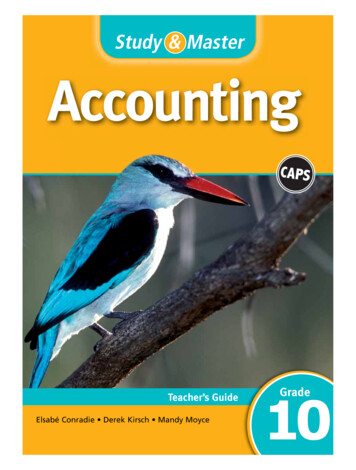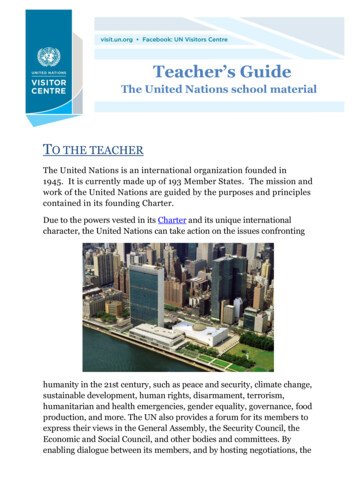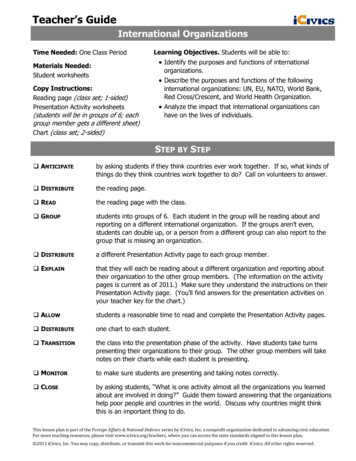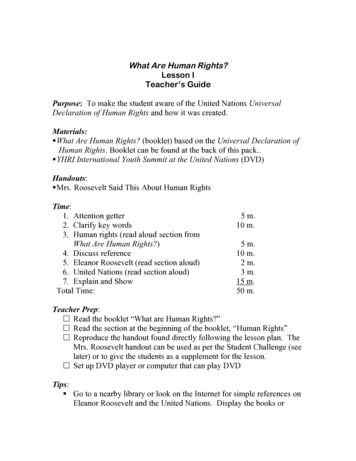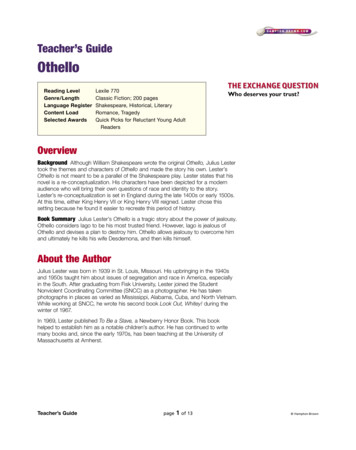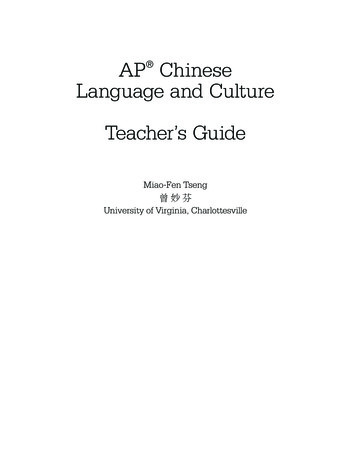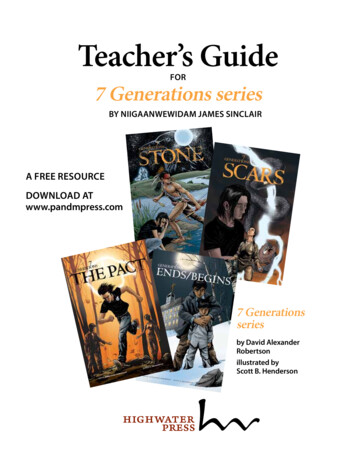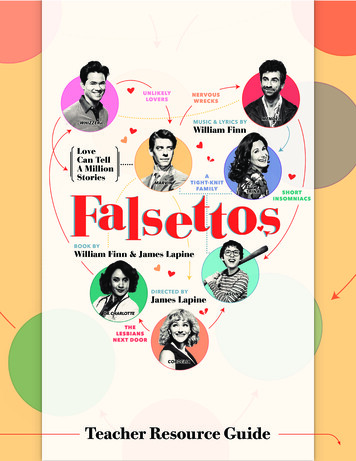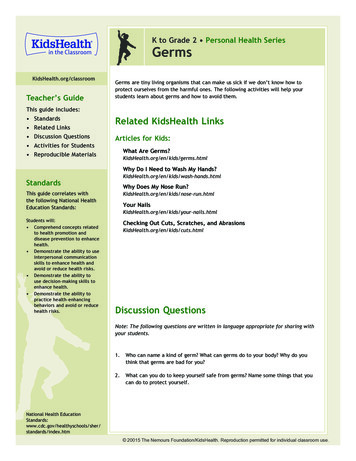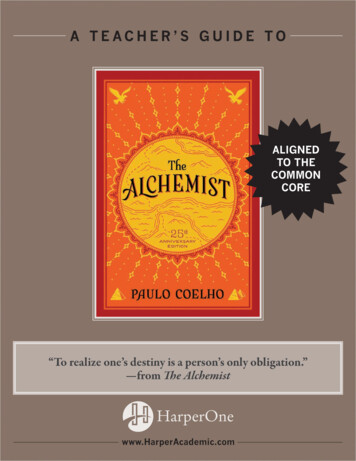
Transcription
A TEACHER’S GUIDE TOALIGNEDTO THECOMMONCORE“To realize one’s destiny is a person’s only obligation.”—from The Alchemistwww.HarperAcademic.com
A TE ACHER’S GUIDE TO PAULO C OELHO’S THE ALCHEMIST2Table of ContentsNote to Teachers3Guided Reading Questions4Questions for Class Discussion5Topics for Research and Writing Projects6Suggestions for Further Reading7Other Books by Paulo Coelho7About This Guide’s Author7
A TE ACHER’S GUIDE TO PAULO C OELHO’S THE ALCHEMIST3The Alchemist by Paulo CoelhoCCS.ELA.Literacy.RL.9-10.10NOTE TO TEACHERSBefore the publication of The Alchemist, Paulo Coelho (b. 1947) worked as a theater director, playwright, and songwriter for someof Brazil’s most popular singers. In 1986, he walked the Road of Santiago, an ancient Spanish pilgrimage, and this experience inspired The Pilgrimage, his first novel, and The Alchemist, whose protagonist takes his name from the road. When The Alchemist waspublished in 1988, it was an instant international bestseller, and reached the #1 slot on bestseller lists in 29 countries. Paulo Coelhobecame one of the most widely read contemporary authors.The Alchemist tells the story of Santiago, the young Andalusian shepherd who dreams of buried treasure in Egypt and embarksupon a challenging and enlightening journey to find it. With all the simplicity and symbolic richness of a fable, Paulo Coelho’snovel is both a hunt for buried treasure and a spiritual quest, with a hero who overcomes trials along the way with the help ofdisguised teachers who guide him.The story begins with Santiago, referred to throughout the novel simply as “the boy,” deciding to sleep in an abandoned churchwith an enormous sycamore growing from the spot where the sacristy once stood. It is here that the boy, who had recently chosennot to become a priest, dreams of his treasure, and it is here that he will finally find it, buried among the roots of the tree, after hereturns from his pilgrimage to the pyramids. These kinds of traditional religious symbols appear throughout The Alchemist, but inCoelho’s story they have either lost their hold or have been transformed. Santiago chooses not to become a priest, his treasure liesin a ruined church, the Old Testament King Melchizedek is now an alchemist, the traditional Islamic pilgrimage to Mecca has beenreplaced by the journey to find one’s “Personal Legend,” and so on.Indeed, Coelho employs ideas that, although derived from alchemy, may be familiar to students from the many New Age conceptsthat have become pervasive in contemporary American culture. In order for the boy to reach his treasure, he must first learn toaccept change, to value simplicity, to trust his experience of daily life over book knowledge. He must learn to live in the presentmoment, to read God’s will in signs and omens, to listen to his heart, and to penetrate the Soul of the World and the Universal Language through which it speaks. In other words, to attain his material treasure Santiago must undergo a spiritual transformation, aprocess that parallels the alchemical transformation of lead into gold.But if The Alchemist has clear lessons to impart, much of the novel’s appeal comes from the way Coelho dramatizes these lessons.As Santiago journeys across the African desert, he falls in love, meets the Alchemist, encounters warring tribesmen, risks his lifeby promising to turn himself into the wind, and is robbed, beaten, and nearly killed just as he thinks he is about to uncover histreasure. The surprise ending, in which the boy learns that his treasure lies not at the pyramids, as his dream had foretold, butback at the abandoned church where his journey began, has powerful implications about the importance of looking into the rootsand foundation of our lives, voyaging outward to find the way back home, and trusting our dreams even when it seems they haveslipped beyond our reach.The questions and activities in this teaching guide were written to support standards-based instruction. The Alchemist meets thestandard for Range of Reading and Level of Text Complexity for grades 9-10. It will fit well in survey courses and, thematically,is a perfect compliment to Homer’s The Odyssey.A complete list of the Common Core State Standards can be found at http://www.corestandards.org/the-standards.
A TE ACHER’S GUIDE TO PAULO C OELHO’S THE ALCHEMIST4Guided Reading QuestionsCCS.ELA-Literacy.W.9-10.91.The novel begins with the boy deciding to spend the night with his flock in an abandoned church. The church has no roofand an enormous sycamore tree has grown up where the sacristy once stood. Why is it important that Santiago dreams ofa child who tells him of his treasure in this particular setting? CCSS.ELA-Literacy.RL.9-10.42.What tests and setbacks does the boy experience on his journey? Why is it important that he faces and overcomes thesechallenges? How would the novel be different if his quest was easier? CCSS.ELA-Literacy.RL.9-10.53.What chain of events leads the boy to work at the crystal shop? What does he learn there? Why is he able to change andimprove the shop, which has remained the same for many years? How is he different from the shop’s owner?CCSS.ELA-Literacy.RL.9-10.34.When Santiago begins his trek across the desert, he meets an Englishman who is a student of alchemy. In many ways theyare alike: both are pursuing their “Personal Legends,” both have encountered the ideas of alchemy. How is their approachto life and learning different? Why does the alchemist choose the boy as his pupil over the Englishman?CCSS.ELA-Literacy.RL.9-10.35.The Englishman tells Santiago that he would like to write “a huge encyclopedia just about the words luck and coincidence.It’s with those words that the universal language is written.” The Swiss psychologist Carl Jung coined the term “synchronicity” to describe such moments of meaningful coincidence. When does Santiago experience this kind ofsynchronicity? What do these experiences reveal? CCSS.ELA-Literacy.RL.9-10.46.The alchemist says that “people become fascinated by pictures and words, and wind up forgetting the language of theworld.” What is this language of the world, or “universal language” as it is called elsewhere in the novel? How is it differentthan ordinary language? Is it spoken or expressed in some other way? Why would a fascination with words and picturesmake people forget it? CCSS.ELA-Literacy.RL.9-10.4 CCSS.ELA-Literacy.L.9-10.57.The boy is repeatedly encouraged to read the signs and omens to learn what he should do. What is an omen? How areomens related to “the universal language” and to finding one’s “Personal Legend”? What are some of the omens that appear to the boy in the novel? Have you ever experienced something that seemed like an omen?CCSS.ELA-Literacy.RL.9-10.2 CCSS.ELA-Literacy.W.9-10.98.How does Santiago feel when he meets Fatima? How does he know this is love? What does she teach him about love?CCSS.ELA-Literacy.RL.9-10.39.Early in the novel, the King tells the boy that his book says what most other books say: “It describes people’s inabilityto choose their own Personal Legends. And it ends up saying that everyone believes the world’s greatest lie. . . that at acertain point, we lose control of what’s happening to us, and our lives become controlled by fate” (p. 18). And yet throughout The Alchemist, the concept of Maktub—the idea that our destiny is already written—is endorsed by many characters.What is the difference between being controlled by fate and discovering one’s “Personal Legend” or destiny?CCSS.ELA-Literacy.RL.9-10.210. How do you interpret the novel’s ending? Why is it significant that Santiago’s treasure is buried not at the Pyramids butback in Spain at the abandoned church where his journey began? What is the meaning of the fact that Santiago learns thisfrom a man who also had a dream but refused to follow it? CCSS.ELA-Literacy.RL.9-10.1 CCSS.ELA-Literacy.RL.9-10.511. The Alchemist is about a shepherd boy who journeys by caravan across the desert, has many magical experiences, andmeets many extraordinary characters. How were you able to relate to the story even though the world it describes is sodifferent from life in contemporary America? What aspects of the story seem most relevant to you? Has reading the novelchanged the way you view your own life? CCSS.ELA-Literacy.RL.9-10.612. What time period do you think The Alchemist takes place in? Are there any clues in the novel? Why do you suppose Coelho hasn’t clearly indicated when the events described in the story take place? Why do you think Santiago is simply called“the boy” throughout the novel? CCSS.ELA-Literacy.RL.9-10.1
A TE ACHER’S GUIDE TO PAULO C OELHO’S THE ALCHEMIST5Questions for Class DiscussionCCSS.ELA-Literacy.SL.9-10.1 CCSS.ELA-Literacy.SL.9-10.1a CCSS.ELA-Literacy.SL.9-10.1c1.What is the significance of Santiago becoming a shepherd rather than a priest, as his parents had hoped? Why has hemade this choice? What does being a shepherd allow him to do? CCSS.ELA-Literacy.RL.9-10.12.King Mechizedek tells the boy that when we are children, “everything is clear and everything is possible,” but as timepasses mysterious forces convince us to abandon our dreams (p. 21). Do you think this is true? What are the “mysteriousforces” that threaten to hold us back as we grow older? CCSS.ELA-Literacy.RL.9-10.23.The King also tells the boy that when you really desire something “all the universe conspires to help you find it.” (pg. 22)And he explains the principle of “favorability,” or beginner’s luck. From whom does Santiago receive help on his journey?Have you ever benefited from beginner’s luck? CCSS.ELA-Literacy.RL.9-10.24.After he has been robbed of all his money in Tangier, how does Santiago choose to regard his situation? Did this surpriseyou? What allows him to understand his loss in this way? CCSS.ELA-Literacy.RL.9-10.35.When Santiago meets the alchemist, he wants to give up his journey to find his treasure and remain at the pyramids. Hehas become a respected counselor at the oasis, he has fallen deeply in love with Fatima, and he wants nothing more thanto stay where he is. How does the alchemist convince him to go on? CCSS.ELA-Literacy.RL.9-10.16.The alchemist says that for the boy to find his treasure he must listen to his heart. Why does the alchemist feel that theheart is more important, or more trustworthy, than the mind? How and why is the heart able to understand things themind can’t grasp? CCSS.ELA-Literacy.RL.9-10.27.When Santiago and the alchemist are captured by one of the warring tribes, Santiago must turn himself into the windto save his life. He asks the desert, the wind, and the sun to help him, but none know how to turn a man into the wind.Where does the boy find the answer? What is the larger significance of this answer? CCSS.ELA-Literacy.RL.9-10.28.If you could ask Paulo Coelho one question, what would it be? How do you think he would answer?CCSS.ELA-Literacy.RL.9-10.1
A TE ACHER’S GUIDE TO PAULO C OELHO’S THE ALCHEMIST6Topics for Research and Writing ProjectsCCSS.ELA-Literacy.W.9-10.9a1.Research the history of alchemy and explore the ways Coelho uses the concepts and practices of this mystical science inThe Alchemist. You might want to consider the relationship between alchemy and the Pyramids; alchemy in Christian andIslamic cultures; or alchemy as a means of both material and spiritual transformation. CCSS.ELA-Literacy.W.9-10.72.Much of the action in The Alchemist hinges on the right interpretation of omens, signs, and meaningful coincidences,which the Swiss psychologist Carl Jung termed synchronicity. Research synchronicity and discuss those moments in thenovel where “coincidence” plays an important role in guiding Santiago. CCSS.ELA-Literacy.RL.9-10.93.Spend several weeks closely observing how you make decisions. Consider the following questions: Do non-rationalfactors play an important role in your choices? Do you ever look for signs or “omens” to guide you? Has reading TheAlchemist changed the way you view this process? Compose a narrative essay in which you recount a decision that youmade and reflect on the factors that influenced your decision-making process. CCSS.ELA-Literacy.W.9-10.3a-e4.In The Alchemist, King Mechizedek explains the principle of “favorability,” or beginner’s luck, a concept that is also important in Zen Buddhism, which emphasizes “beginner’s mind.” Do some research on this topic and discuss how it worksin the novel. In what situations does it help Santiago? Why would a beginner be luckier than someone with more experience? Have you ever benefited from beginner’s luck or witnessed someone else who did something surprisingly well thefirst time? CCSS.ELA-Literacy.RL.9-10.6 CCSS.ELA-Literacy.W.9-10.75.Write a paper discussing what you think your own “Personal Legend” is. Do you have a dream you want to achieve inyour life? Using The Alchemist as a guide, create a multimedia visual essay that describes your “Personal Legend.” Youressay should incorporate images, sound, and text. CCSS.ELA-Literacy.SL.9-10.4 CCSS.ELA-Literacy.SL.9-10.56.Many spiritual quests involve a journey into the desert. Research the subject of desert spirituality and discuss the relationship between the outer landscape and inner world in The Alchemist. In what ways is the desert the perfect landscape for aspiritual journey? What does Santiago learn about himself from the desert? .97.Write a formal literary analysis that examines the student/teacher relationships in The Alchemist. Look at all of Santiago’steachers—human, divine, animal, and natural and discuss what the boy learns from these teachers.CCSS.ELA-Literacy.W.9-10.2a-f8.Write a paper imagining what Santiago’s life might be like after the novel ends. Would he continue to be a seeker, or wouldhe simply settle down with Fatima and live a contented life? CCSS.ELA-Literacy.W.9-10.3a-e9.Write a paper discussing the significance of the novel’s ending—of the boy finding his treasure back where his journey began, buried among the roots of a tree, in the very church where he dreamed of his treasure. Did the ending surprise you?Did it change the way you look at everything that leads up to it? What might the tree represent in this context? Why didthe boy have to go so far to find that the treasure was back home? -10.4
A TE ACHER’S GUIDE TO PAULO C OELHO’S THE ALCHEMIST7Suggestions for Further ReadingThe Pilgrimage: A Contemporary Quest for Ancient Wisdom, Paulo CoelhoThe Valkyries, Paulo CoelhoBy the River Piedra I Sat Down & Wept, Paulo CoelhoThe Fifth Mountain, Paulo CoelhoThe Little Prince, Antoine De Saint- ExuperyJonathan Livingston Seagull, Richard BachThe Prophet, Kahlil GibranThe Book of Merlyn, T.H. WhiteThe Lion, The Witch, and the Wardrobe, C.S. LewisThe Alchemist in Life, Literature, and Art, John ReadThe Wonderful Wizard of Oz, L. Frank BaumThe Tao of Psychology, Jean BolenOther Books by Paulo CoelhoFictionHell ArchivesPractical Manual of VampirismThe PilgrimageBridaThe Greatest GiftThe ValkyriesMaktubBy the River Piedra I Sat Down and WeptThe Fifth MountainLove Letters from a ProphetVeronika Decides to DieEssential WordsThe Devil and Miss PrymFathers, Sons and GrandsonsEleven MinutesThe Genie and the RosesAnd on the Seventh DayThe ZahirRevived PathsLike the Flowing RiverThe Witch of PortobelloManuscript Found in AccraNon-FictionThe Diary of a MagusThe Manual of the Warrior of LightJourneysLife: Selected QuotationsAlephAbout This Guide’s AuthorAmy Jurskis is the author of a number of teaching guides, including The Immortal Life of Henrietta Lacks by Rebecca Skloot andAmerican Tapestry by Rachel Swarns. She holds a B.A. in English from the University of Georgia and a MAT from Agnes ScottCollege. A former department chair for language arts in a title one public school in Atlanta, she currently serves as a chairpersonof curriculum and English teacher at Oxbridge Academy of the Palm Beaches.You’ll find more aligned teaching guides at http://academic.hc.com/commoncore
A TEACHER’S GUIDE TO PAULO COELHO’S THE ALCHEMIST 3 CCS.ELA.Literacy.RL.9-10.10 NOTE TO TEACHERS Before the publication of The Alchemist, Paulo Coelho (b. 1947) worked as a theater director, playwright, and songwriter for some of Brazil’s most popular singers.File Size: 1MB
